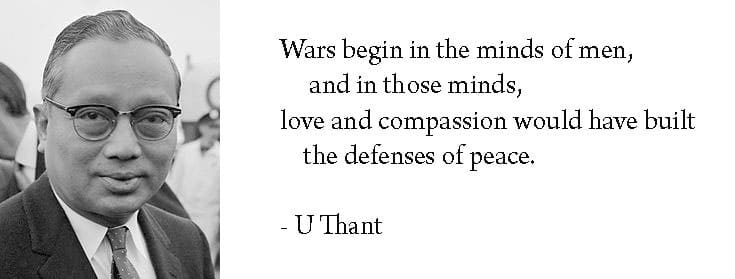U Thant – the UN third Secretary-General was a supreme diplomat and peacemaker. His Buddhist practise helped him to cultivate the detachment, equanimity and compassion which turned helped tun philosophy into a practical peace-reality. Striving to deal with the turbulent world of the 1960s and 70s, U Thant was widely respected for his promotion of world peace and world oneness.
” Two world wars were fought to make the world safe for democracy. Today we have to wage a war on all fronts. This war has to be waged in peace time, but it has to be waged as energetically and with as much total national effort as in times of war. The war we have to wage today has only one goal, and that is to make the world safe for diversity.”
– U Thant
“The concept of peaceful coexistence has been criticized by many who do not see the need to make the world safe for diversity. I wonder if they have ever paused to ask themselves the question: What is the alternative to coexistence?”
– U Thant, Address of 1964, republished in Portfolio for Peace (1968), p. 14
“Every human being, of whatever origin, of whatever station, deserves respect. We must each respect others even as we respect ourselves. This, as the sages of many lands have taught us, is a golden rule in individual and group, as well as international, relations.”
U Thant, Portfolio for Peace (1968), p. 92
“As a Buddhist, I was trained to be tolerant of everything except intolerance.”
– U Thant, View from the UN (1978)
“It is far from my intention to claim that I have reached a very high stage on the path to attainment of the highest wisdom, or that I have attained complete “inner peace.” However, I can claim that I practice bhavana every day. I try to cultivate the ethical aspects of Buddhism, and I believe that I have attained a greater degree of emotional equilibrium than most people.”
– U Thant
For are not birth and death the two phases of the same life process? According to the Buddha, birth is followed by death, but death, in turn, is followed by rebirth.
– U Thant p. 23
“To understand my feelings — and my conception of the role of Secretary General — the nature of my religious and cultural background must first be understood. I should therefore like to outline not only my beliefs but also my conception of human institutions and of the human situation itself.”
– U Thant p. 23
“As a Buddhist, I was trained to be tolerant of everything except intolerance. I was brought up not only to develop the spirit of tolerance but also to cherish moral and spiritual qualities such as modesty, humility, compassion, and, most important, to attain a certain degree of emotional equilibrium.”
– U Thant
“Many of the problems that we face today are due to, or the result of, false attitudes – some of them have been adopted unconsciously. Amongst these is the concept of narrow nationalism – ‘my country, right or wrong’. It is lack of truth in international relations that leads to the conscious or unconscious adoption of double standards. It is therefore essential that, in international relations as in human relations, we should practice, as we preach to others, the universal principle of truth. “
U Thant – Muller, R. (1977). The Example of a Great Ethical Statesman: U Thant. New York: Agni Press (printed as a special supplement to the United Nations Meditation Group Bulletin).
“Many of the problems that we face today are due to, or the result of, false attitudes – some of them have been adopted unconsciously. Amongst these is the concept of narrow nationalism – ‘my country, right or wrong’. It is lack of truth in international relations that leads to the conscious or unconscious adoption of double standards. It is therefore essential that, in international relations as in human relations, we should practice, as we preach to others, the universal principle of truth. “
U Thant – Muller, R. (1977). The Example of a Great Ethical Statesman: U Thant. New York: Agni Press (printed as a special supplement to the United Nations Meditation Group Bulletin).
“It is understandable that the major powers should pursue objectives which seem to them to be in their own national interest; but they should not be blind to the existence of a larger goal, the common interest of all countries, larger and small, in the survival of the human race. They should, at least occasionally, pause to reflect on the course of history, which has seen the rise and fall of so many great empires. Generations to come will judge the conduct of those in positions of authority today by the effect that their actions had on the course of human peace and progress. If they wish to have an honored place in human history they must appear as men of peace and not as mere victors in war.”
U Thant – Muller, R. (1977). The Example of a Great Ethical Statesman: U Thant. New York: Agni Press (printed as a special supplement to the United Nations Meditation Group Bulletin).
Related


Comments are closed.
*/